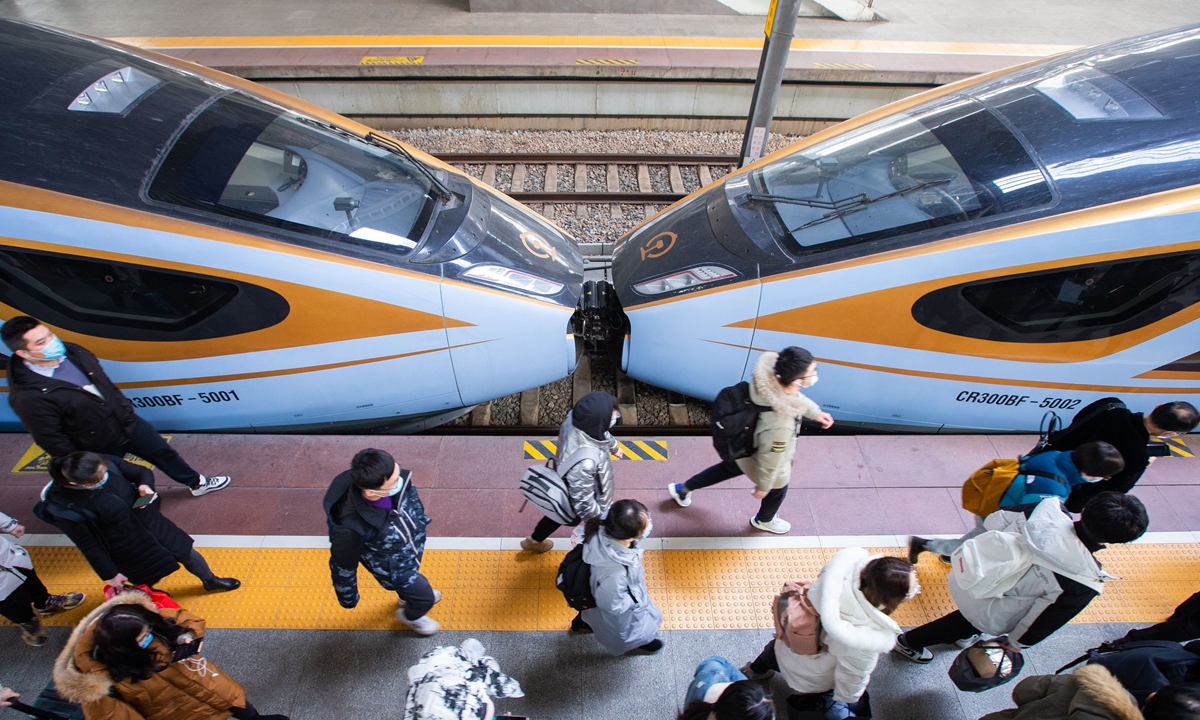
Passengers disembark at Nanjing Railway Station in Nanjing, Capital of East China's Jiangsu Province, on January 3, 2022, the last day of China's New Year's Day holiday. Photo: IC
The forthcoming Spring Festival travel rush, the third annual human migration across the world's second-largest economy amid the COVID-19 pandemic, will likely be the least busy in seven years with estimated 280 million railway passenger trips. It mirrors a more adept approach to sustaining economic resilience amid the traditional holidays, observers said.
The 2022 railway travel rush will begin on January 17 and end on February 25. Passenger trips via railways are estimated to reach 280 million during the 40-day travel season, an increase of 28.5 percent from last year, China State Railway Group Co said in a statement sent to the Global Times. Rail ticket presale for the annual travel rush started on Monday.
An executive with the transport division of China State Railway Group was cited as saying that the 2022 travel rush will confront multiple challenges, including targeted epidemic prevention and control efforts and moves to guarantee transportation during the 2022 Beijing Winter Olympic Games.
Estimates suggest the imminent annual flow of people would be the lowest in the past seven years, the China Business Journal reported on Sunday.
In 2021, China State Railway Group put its passenger trip estimates at 407 million, but the actual number was only 218 million, less than 75 percent of the estimated number, according to the report. During the first travel rush after the coronavirus hit, rail passenger trips totaled 210 million, a fall of 47.3 percent from a year ago.
Meanwhile, the coronavirus pandemic, which has fueled livestream marketing and e-commerce, and, a stay-at-home economy at large, is refashioning average folks' attitudes toward celebrating the Spring Festival, which previously included paying in-person visits to relatives and friends, Zhu Qiucheng, CEO of Ningbo New Oriental Electric Industrial Development, told the Global Times on Monday.
Moreover, local governments and businesses have become more adroit in encouraging residents to opt for staying put, thereby minimizing virus-spreading risks and keeping the supply chains stable, Zhu said, citing a local push to endorse businesses' moves to retain employees during the upcoming holidays.
As part of efforts to stabilize production, the municipal government in Ningbo, East China's Zhejiang Province, where many export-oriented private firms are located, unveiled series of virus-preventive measures in mid-December. Among the measures are consumption promotions to encourage non-local staffers to stay in the city. Local businesses are also advised to arrange for their staffers to stagger vacations.
According to a report by the Economic Daily in late December, 29 provinces and cities have advocated the local celebration of the Spring Festival.
Recently, seven government departments including the Ministry of Human Resources and Social Security issued a notice to launch a campaign between January 21 and the end of March, largely coinciding with the travel rush, to retain employees during the holidays.
Reflecting the stay-put mode, non-locals with Zhu's company have decided to remain in Ningbo for the holidays, according to Zhu.
While travel-related businesses, especially those involved in cross-provincial tourism, would take a hit from the stay-put trend, overall holiday consumption may keep resilient, as suggested by some microeconomic activities.
An employee of a restaurant in Beijing's Chaoyang district, who has chosen to stay in the capital city, told the Global Times on Monday that his company expects the upcoming holidays to be busier than in previous years, which could mean a larger bonus for the employees, as more people are expected to stay in Beijing during the holidays.
Economists also feel confident about the economy, which is buoyed by pro-growth government policies.
China's monetary policy is expected to remain prudent and relatively at ease, with an effective yet targeted implementation of the monetary policy to play a better part in propping up the real economy, said Lian Ping, head of the Zhixin Investment Research Institute.
Domestic consumption will remain robust. In the first 11 months of 2021, retail sales growth, a closely watched gauge of China's consumption, came in at 13.7 percent, official data showed. This suggests a rise of 8.2 percent from the same period of 2019. For the whole year of 2021, retail growth is likely to reach 13 percentages rise.
In 2022, the consumption growth will likely moderate to 6.5 percent expansion from 2021, according to the Bank of Communications.
The bank economists anticipate that tourism, catering, aviation and hotel business will rebound in 2022, although they don't expect a boom in pent-up spending. Auto-related consumption will grow while housing-related spending will tend to be sluggish.
During the three-day New Year holidays which ended on Monday, passenger trips via railway, highway, waterway and air fell 18.2 percent to 86.19 million, official data said.




